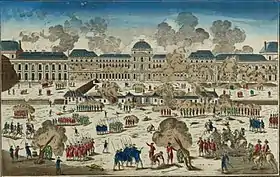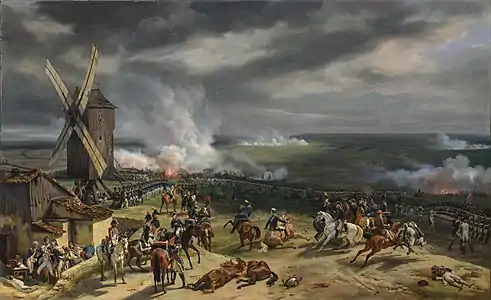1792 in France
| |||||
| Decades: |
| ||||
|---|---|---|---|---|---|
| See also: | Other events of 1792 History of France • Timeline • Years | ||||
Events from the year 1792 in France.
Incumbents
- Monarch: Louis XVI (until 21 September; monarchy abolished)
- The Legislative Assembly (until 21 September)
- The National Convention (from 21 September)
Events
March
- 25 March – The Legislative Assembly agrees that the guillotine should be used for judicial executions.
April
- 20 April – The Legislative Assembly declares war against Austria, starting the French Revolutionary Wars and War of the First Coalition.
- 25 April
- Highwayman Nicolas Pelletier becomes the first person executed by guillotine in France, in what becomes the Place de l'Hôtel de Ville in Paris.
- La Marseillaise, the French national anthem, is composed by Claude Joseph Rouget de Lisle.
June
- 13 June – Prussia declares war against France.
- 20 June – Demonstration of 20 June 1792.
August

10 August: Storming of the Tuileries
(Musée de la Révolution française)
(Musée de la Révolution française)
- 10 August – French Revolution: Insurrection of 10 August 1792 – The Tuileries Palace is stormed and Louis XVI of France is arrested and taken into custody.
- 20 August – War of the First Coalition: Battle of Verdun – Prussia defeats France, opening a route to Paris.[1]
- 21 August – Royalist Louis Collenot d'Angremont becomes the first person executed by guillotine for political reasons, in the Place du Carrousel in Paris.
September
- 2–19 September – 1792 French National Convention election.
- 2–7 September – French Revolution: September Massacres – Rampaging mobs in Paris slaughter three Roman Catholic bishops and more than 200 priests, together with at least 1,000 criminals.
- 9 September – 9 September massacres at Versailles.
- 11 September – Six men steal some of the former French Crown Jewels from a warehouse, where the revolutionary government has stored them.
- 14 September – Radical antimonarchist Thomas Paine flees from England to France, after being indicted for treason. He is tried in absentia during December and outlawed.[2]
- 20 September – French Revolutionary Wars: Battle of Valmy – The French revolutionary army defeats the Prussians under the Duke of Brunswick after a 7-hour artillery duel.

20 September: Battle of Valmy
- 21 September – French Revolution: A Proclamation of the abolition of the monarchy by the French Convention goes into effect, and the French First Republic is established, effective the following day.
- 22 September – French Revolution: The Era of the historical French Republican Calendar begins.
November
- 6 November – War of the First Coalition: Battle of Jemappes – Austrian armies under the command of Duke Albert of Saxe-Teschen are defeated in Belgium (at this time part of the Austrian Netherlands) by the French Army led by General Charles François Dumouriez.[3]
- 19 November – The National Convention passes a resolution pledging French support for the overthrow of the governments of other nations.[4]
December
- 26 December – The trial of Louis XVI of France begins.
Full date unknown
- Claude Chappe successfully demonstrates the first semaphore line, between Paris and Lille.
- Barthélemy Catherine Joubert, future general, becomes sub-lieutenant.
Births
- 21 May – Gaspard-Gustave Coriolis, engineer, scientist
- 9 August – Charles-François Lebœuf, sculptor
- 25 August – Jean-Baptiste Duvergier, lawyer
- 28 November – Victor Cousin, philosopher
Deaths
- 1 March – Jean Godin des Odonais, cartographer and naturalist
- 12 May – Charles Simon Favart, dramatist
- 29 July – René Nicolas Charles Augustin de Maupeou, Chancellor of France
- 23 August – Arnaud II de La Porte, statesman (executed)
- 25 August – Jacques Cazotte, writer (executed)
- 3 September – Marie Thérèse Louise of Savoy, Princesse de Lamballe, princess, courtier to Marie Antoinette (murdered during the French Revolution)
- 8 September – Charles d'Abancour, statesman
- 22 October – Guillaume Le Gentil, astronomer
- 7 December – Marie Jeanne Riccoboni, novelist
- Full date unknown – Nicholas Adam, grammarian
References
- Parker, Geoffrey (2008). The Cambridge Illustrated History of Warfare. New York: Cambridge University Press. p. 195. ISBN 978-0-521-73806-4. Retrieved 2012-01-22.
- Palmer, Alan; Veronica (1992). The Chronology of British History. London: Century Ltd. pp. 232–233. ISBN 978-0-7126-5616-0.
- Evans, Eric J. (2014). The Forging of the Modern State: Early Industrial Britain, 1783–1870. Routledge.
- Bisset, Robert (1822). The Reign of George III: To which is Prefixed a View of the Progressive Improvements of England in Property and Strength to the Accession of His Majesty. 2. Edward Parker. p. 855.
This article is issued from Wikipedia. The text is licensed under Creative Commons - Attribution - Sharealike. Additional terms may apply for the media files.
.svg.png.webp)
.jpg.webp)
